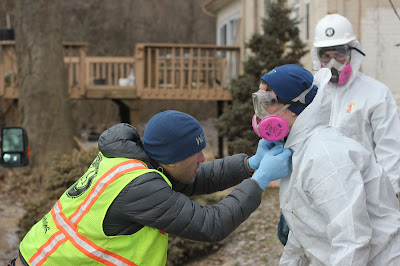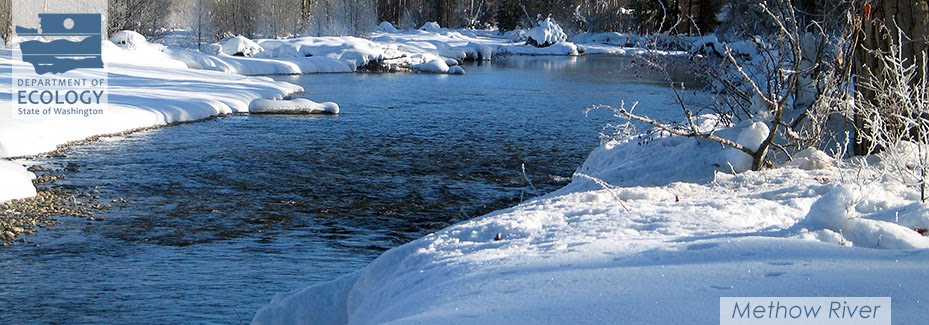 |
| Our AmeriCorps members responded to severe flooding in Missouri in 2016. |
WCC services requested at the federal level
The Federal Emergency Management Agency (FEMA) has a direct partnership with the Corporation for National and Community Service (CNCS), the federal agency that administers AmeriCorps. When a disaster strikes, FEMA can leverage AmeriCorps members—including our Washington Conservation Corps—to assist disaster response efforts by issuing a “mission assignment” dedicating funds for direct service in identified, underserved communities affected by the disaster.
How do AmeriCorps members fit in?
Nationwide, 17 programs collectively respond to disaster mission assignments. Working together, they form AmeriCorps Disaster Response Teams or A-DRT. Many of these programs are similar to WCC, providing hands-on service opportunities to youth, young adults, and military veterans.
 |
| A-DRT members gather for a photo during the third wave of response efforts in Missouri in 2016. |
‘How many crews can you send, and when can they arrive?’
When a disaster response assignment is likely, CNCS puts out a call for availability to all A-DRTs across the country. They report to FEMA how many A-DRT members are available, and when.
In the WCC, our project coordinators manage our 52 crews and 19 individual placement AmeriCorps members. They work closely with WCC Program Director Nick Mott to determine if we are able to respond. WCC strives to respond as often as we can, while also prioritizing our habitat restoration and trail projects for our partners here in Washington.
Upon finalizing the mission assignment, a flurry of travel plans and logistics begin. WCC staff and supervisors coordinate tools and supplies, order team identification badges, and make sure our AmeriCorps members have the information they need to pack for disaster deployments that can take them away from home for up to 30 days at a time.
WCC supervisors and members hold key leadership positions
With 15 years of disaster response experience, WCC often receives requests to take key leadership positions during disaster deployments. WCC supervisors often serve as incident commander, safety officer, or planning chief. From our experiences, WCC knows how to work in a formalized incident command structure. Their defined roles during deployments help ensure effective communication as well as smooth transitions between different waves of A-DRT members. While WCC deploys at least one of our five disaster response specialists each mission assignment, any WCC crew has the potential of deploying.
 |
| Personal protective equipment such as Tyvek suits and respirators help keep members safe during field assignments. |
After A-DRTs arrive, our WCC supervisors and AmeriCorps members lead and participate in trainings. They also set up forward operating bases or primary “hubs” in identified communities. This means another wave of details and logistics: securing food distribution, laundry and shower facilities, tool and equipment storage, and more!
Then, members head out to assist communities in need in the form of “strike teams.” AmeriCorps members receive training to complete a variety of field tasks, including:
• Removing hazard trees from homes and structures.
• Installing blue tarps and making temporary roof repairs.
• “Mucking and “gutting” – a term for stripping a home to remove water-damaged material.
• Removing debris from homes and yards.
• Conducting mold suppression.
WCC’s training program also focuses on managing volunteers and volunteer reception centers as well as mental health, safety, and communications needs.
Year-in-Review: 2017-2018 Disaster Response
In addition to restoring salmon habitat, planting native trees and shrubs, and building trails, the 2017-2018 AmeriCorps service year was a whirlwind of disaster response accomplishments! WCC embarked on the largest deployment in program history due to an unprecedented request from FEMA after Hurricanes Harvey, Irma, and Maria made landfall in September 2017.
In six months, WCC deployed two-thirds of program member and staff to Texas, Florida, U.S. Virgin Islands, and Puerto Rico to assist underserved communities after these devastating hurricanes.
In response to the hurricanes, WCC and A-DRT:
• Mucked and gutted 611 structures.
• Cleared 53,979 cubic yards of debris from homes and yards.
• Temporarily repaired or installed tarps on 544 roofs.
• Sorted 132,713 pounds of donations.
• Removed 2,284 trees posing a hazard.
 |
| Our AmeriCorps members filled and placed sandbags in three eastern Washington counties in May. |
When local disasters occur, local and tribal government partners also request WCC assistance. In May, WCC deployed teams to fill and stack sandbags for residents in Ferry, Okanogan and Pend Oreille counties after severe flooding. We also responded to 12 wildfires, mostly in northwest Washington. In total, 258 members and staff provided nearly 120,000 hours to communities in need over the course of last year.
Learn more about WCC
Ecology's Washington Conservation Corps, an AmeriCorps program, provides hands-on experience, field skills, and training opportunities to young adults between 18 and 25 and military veterans. WCC consists of three subprograms: the original WCC, Veteran Conservation Corps and Puget SoundCorps. Recruitment for the 2018-19 year is just wrapping up, but six-month positions will open in January 2019! See photos of the types of projects WCC members support during their service in our WCC Projects Flickr set and WCC Featured Projects Story Map. Learn more on our website.
 |
| Our AmeriCorps members restore habitat for wildlife and salmon, and build and maintain backcountry and urban trails across Washington. |

No comments:
Post a Comment